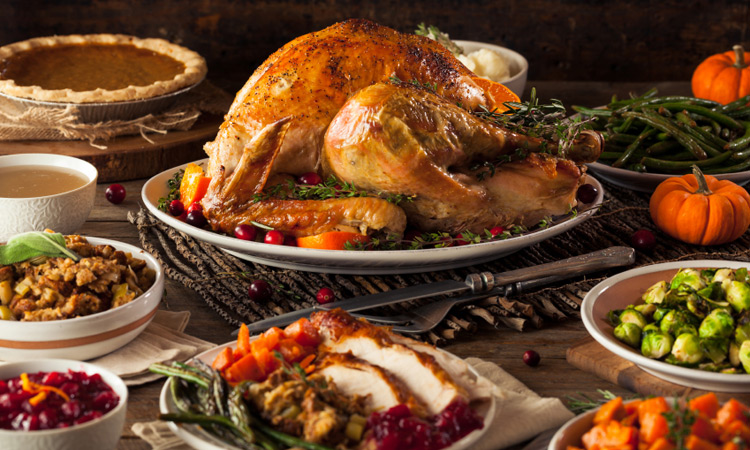 Thanksgiving is arguably the most festive Americans get throughout the year. It is a holiday that totally captures the essence of what it is to be living the American dream. With that comes a fair amount of excess. We’ve all overeaten at the Thanksgiving table. It’s a given. But indulging on Turkey day has quickly become a prime example of why more than two in three adults in the country are considered to be overweight or obese.
Thanksgiving is arguably the most festive Americans get throughout the year. It is a holiday that totally captures the essence of what it is to be living the American dream. With that comes a fair amount of excess. We’ve all overeaten at the Thanksgiving table. It’s a given. But indulging on Turkey day has quickly become a prime example of why more than two in three adults in the country are considered to be overweight or obese.
According to research gathered by the Calorie Control Council, the average American consumes more than 4,500 calories on Thanksgiving Day. The calories aren’t the only alarming statistic with a staggering 229 grams of fat being downed in that same 24-hour period. How does this happen? Typically, the average holiday dinner in the United States delivers about 3,000 calories. That number is on top of the roughly 1,500 calories we take in through appetizers and drinks. That’s double the recommended daily allowance for average males to eat in one day, and considerably more than three times the fat requirement!
But you don’t have to skip the greatest meal of the year in order to bypass holiday weight gain. Here are four tips to help you navigate Thanksgiving Day without packing on the pounds.
1. Eat a proper breakfast
This may seem like a no-brainer, but that doesn’t stop millions of Americans from skipping breakfast on the special day to erroneously ‘save room’ for the big meal. According to research published in the journal Obesity, lead by Heather Leidy, assistant professor in the MU Department of Nutrition and Exercise Physiology: “Incorporating a healthy breakfast containing protein-rich foods can be a simple strategy for people to stay satisfied longer, and therefore, be less prone to snacking. People reach for convenient snack foods to satisfy their hunger between meals, but these foods are almost always high in sugar and fat and add a substantial amount of calories to the diet. These findings suggest that a protein-rich breakfast might be an effective strategy to improve appetite control and prevent overeating.”
2. Drink water before you eat
Research has shown that drinking water before any meal will not only help you to stay hydrated but will also help you curb your appetite and inevitable weight gain. According to research published by the American Chemical Society, simply drinking two cups of water before each meal can have a massive impact on subsequent caloric intake. Study author, Brenda Davy, Ph.D. associate professor of nutrition at Virginia Tech, concluded “middle aged and older people who drank two cups of water right before eating a meal ate between 75 and 90 fewer calories during that meal.”
3. Be mindful with portion control
Think you have self-control? Thing again. According to Dr Barbara Rolls, holder of Guthrie Chair of Nutrition in Penn State’s College of Health and Human Development and lead on a recent study about overeating, most people will eat larger portions simply because the food is on their plates or on the table in front of them. She clarified by saying “Men and women, normal-weight and overweight individuals, restrained and unrestrained eaters, all responded to larger portion size by eating more.” This means that you can immediately save calories and avoid weight gain by not overfilling your plate, making sure that what’s on your plate always is primarily healthy fare and by keeping calorie-packed foods like dressings on the side to be more aware of exactly how much you are eating.
4. Know when to stop
You may think you know when to stop piling food on your plate and past your lips, but the truth is that on days like Thanksgiving, Americans have proven they don’t know when to stop feeding. According to Michelle Morgan, a registered dietitian at New York-Presbyterian Hospital/Weill Cornell Medical Center, you need to “Stay in tune with your hunger during holiday meals. If you feel satiated and comfortable–stop eating!” Your best bet is to pause between refills and let your dinner settle. If you want to ensure you don’t overeat at all, many nutritionists suggest putting your fork down between each bite. That will slow your eating, force you to chew everything thoroughly and ultimately be more mindful of each bite.
Overeating at Thanksgiving doesn’t have to be a given. The key is to be mindful of your intake while you’re enjoying the most beloved meal of the year. If you do this, combined with the aforementioned tips, you’ll enjoy every bite without overdoing it and gaining weight. Enjoy and Happy Thanksgiving!
Click here to find out about Rose’s thoughts on wellbeing and health


